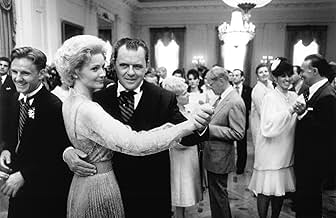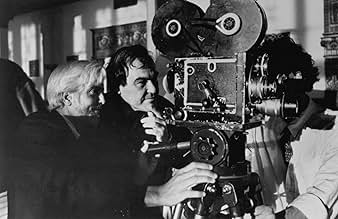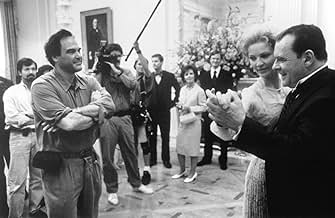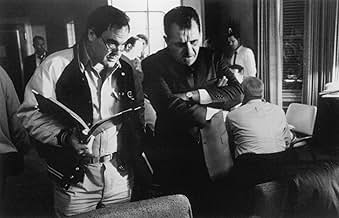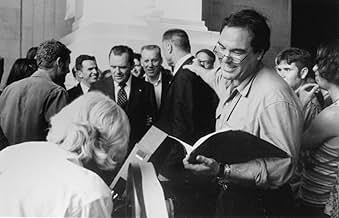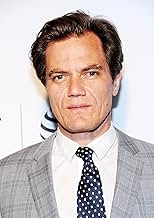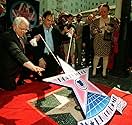CALIFICACIÓN DE IMDb
7.0/10
34 k
TU CALIFICACIÓN
Biografía del expresidente estadounidense Richard Nixon, desde sus días de niño hasta su eventual presidencia, que terminó en vergüenza.Biografía del expresidente estadounidense Richard Nixon, desde sus días de niño hasta su eventual presidencia, que terminó en vergüenza.Biografía del expresidente estadounidense Richard Nixon, desde sus días de niño hasta su eventual presidencia, que terminó en vergüenza.
- Dirección
- Guionistas
- Elenco
- Nominado a 4 premios Óscar
- 11 premios ganados y 18 nominaciones en total
- Dirección
- Guionistas
- Todo el elenco y el equipo
- Producción, taquilla y más en IMDbPro
Opiniones destacadas
I will start by saying I am an Oliver Stone fan. For some particular reason though I did not expect to like this movie but obviously I did. He actually unexpectedly gave a very fair depiction of Nixon. Nixon really transformed before my eyes in here. That was really something special to see.
The acting was quite good. Anthony Hopkins though totally uplifted this movie. I could imagine many people saying his performance was over-the-top or a bit too surreal at times. Yet that is what really made his performance so amazing. The way he was able to transform the many crazy and totally off the wall aspects of Nixon and make them into a reality. To me as the movie went on I felt I was in some way able to see his paranoia, anxiety, thirst for power and just the simple fact of wanting to be liked. I could see he was more of a troubled and vulnerable man than a monster. He never quite connected with anybody which made him bitter and fueled his paranoia and greed even more. To me Hopkins portrayed this all perfectly, all the complexities and inner feelings of Nixon. Hopkins slipped into this role in way that you rarely see. He became Nixon, and at times I was speechless or should I say thoughtless watching him portray such an important figure in such a way. More and more I felt sorry for Nixon, as he looked more and more like a schizophrenic. To me this role was more psychologically bone-chilling than his role as Hannibal Lechter in Silence of the Lambs and I have no problem debating that.
The rest of the cast was quite good as well. Joan Allen was very good in showing the complex relationship/marriage she had with Richard Nixon. James Woods freaked me out at times displaying that pure evil and hatred at times that Hopkins showed as Nixon. Paul Sorvino was very good as Henry Kissinger. Mary Steenburgen was interesting to watch in the very limited time she played in here. The two actors though other than Hopkins though that really stood out to me were Bob Hoskins and Sam Waterston. Despite Hoskins not giving an amazing performance and having very limited time he gave me chills just seeing J. Edgar Hoover being portrayed in some sort of way. Sam Waterston despite being limited to really just one scene was even more chilling than the rest of the cast(excluding Hopkins) combined in that one moment. That moment was one of the most intense face to face scenes that I have ever seen. It was so memorable.
The directing was very good. It was not the best I have seen from Oliver Stone but it was up there. For the first 45 minutes or so I was a bit confused about what was happening and the flow of the movie but I got used to it. The first portion of the movie did feel unbalanced at times but the feel of the movie got better as it wore on. Going back to that one scene between Sam Waterston and Anthony Hopkins, I felt this scene was one of the best directed and written scenes I have seen from Oliver Stone or anyone ever. That scene was a microcosm of the movie. The motion-sickness, mind scrambling, paranoid feeling of that scene captured the entire movie. The feeling of even seeing the president himself being treated like a puppet, despite not that shocking, was mind numbing to watch. That scene was true testament to the writing and directing abilities of Oliver Stone.
The writing was also very good throughout. It seemed as if everything Stone wanted to get across got across. The writing was not amazing but it certainly served it duty. The cinematography was great though. Stone always knows how to get his point across in the way he photographs a movie even if all of other aspects of the movie fail. That dark Oliver Stonish feeling kept on creeping in on every scene, but also that dark psychological feeling that he had put in Born On the Fourth of July and Platoon also was felt through the cinematography. The music by John Williams, who always knows how to capture a moment musically, was simply perfect in here again.
I can understand this movie being boring to a lot of people or it being considered propaganda. Yet I think this movie is an overlooked masterpiece. Just seeing Anthony Hopkins perform as Nixon is a good enough reason to see this movie. He took control of this movie by force and took it to another level. Despite this being an Oliver Stone movie it is more fair than you would think. Of course this movie may have a few conspiracy theories included in it but Oliver Stone never forces his theories on people. There is a reason why at the beginning at every movie he puts a disclaimer saying that not everything in his movies are facts. Despite it being great I don't know if this is a movie for everyone. This movie seems to be crazy and surreal but isn't that how life seems to be at times as well?
The acting was quite good. Anthony Hopkins though totally uplifted this movie. I could imagine many people saying his performance was over-the-top or a bit too surreal at times. Yet that is what really made his performance so amazing. The way he was able to transform the many crazy and totally off the wall aspects of Nixon and make them into a reality. To me as the movie went on I felt I was in some way able to see his paranoia, anxiety, thirst for power and just the simple fact of wanting to be liked. I could see he was more of a troubled and vulnerable man than a monster. He never quite connected with anybody which made him bitter and fueled his paranoia and greed even more. To me Hopkins portrayed this all perfectly, all the complexities and inner feelings of Nixon. Hopkins slipped into this role in way that you rarely see. He became Nixon, and at times I was speechless or should I say thoughtless watching him portray such an important figure in such a way. More and more I felt sorry for Nixon, as he looked more and more like a schizophrenic. To me this role was more psychologically bone-chilling than his role as Hannibal Lechter in Silence of the Lambs and I have no problem debating that.
The rest of the cast was quite good as well. Joan Allen was very good in showing the complex relationship/marriage she had with Richard Nixon. James Woods freaked me out at times displaying that pure evil and hatred at times that Hopkins showed as Nixon. Paul Sorvino was very good as Henry Kissinger. Mary Steenburgen was interesting to watch in the very limited time she played in here. The two actors though other than Hopkins though that really stood out to me were Bob Hoskins and Sam Waterston. Despite Hoskins not giving an amazing performance and having very limited time he gave me chills just seeing J. Edgar Hoover being portrayed in some sort of way. Sam Waterston despite being limited to really just one scene was even more chilling than the rest of the cast(excluding Hopkins) combined in that one moment. That moment was one of the most intense face to face scenes that I have ever seen. It was so memorable.
The directing was very good. It was not the best I have seen from Oliver Stone but it was up there. For the first 45 minutes or so I was a bit confused about what was happening and the flow of the movie but I got used to it. The first portion of the movie did feel unbalanced at times but the feel of the movie got better as it wore on. Going back to that one scene between Sam Waterston and Anthony Hopkins, I felt this scene was one of the best directed and written scenes I have seen from Oliver Stone or anyone ever. That scene was a microcosm of the movie. The motion-sickness, mind scrambling, paranoid feeling of that scene captured the entire movie. The feeling of even seeing the president himself being treated like a puppet, despite not that shocking, was mind numbing to watch. That scene was true testament to the writing and directing abilities of Oliver Stone.
The writing was also very good throughout. It seemed as if everything Stone wanted to get across got across. The writing was not amazing but it certainly served it duty. The cinematography was great though. Stone always knows how to get his point across in the way he photographs a movie even if all of other aspects of the movie fail. That dark Oliver Stonish feeling kept on creeping in on every scene, but also that dark psychological feeling that he had put in Born On the Fourth of July and Platoon also was felt through the cinematography. The music by John Williams, who always knows how to capture a moment musically, was simply perfect in here again.
I can understand this movie being boring to a lot of people or it being considered propaganda. Yet I think this movie is an overlooked masterpiece. Just seeing Anthony Hopkins perform as Nixon is a good enough reason to see this movie. He took control of this movie by force and took it to another level. Despite this being an Oliver Stone movie it is more fair than you would think. Of course this movie may have a few conspiracy theories included in it but Oliver Stone never forces his theories on people. There is a reason why at the beginning at every movie he puts a disclaimer saying that not everything in his movies are facts. Despite it being great I don't know if this is a movie for everyone. This movie seems to be crazy and surreal but isn't that how life seems to be at times as well?
This is a scary one. A merciless look into the pathology of one weird bloke. Anthony Hopkins may not look like Nixon but he does the role to perfection. It is truly scary.
Great cast. Hopkins is a hard working star. What a shame he lost to the Hoffman aper Cage. And Nixon? What a loser. What a terrible insufferable tragic loser. It surely was a challenge to do this for Hopkins.
The biggest most significant detriment is of course one knows not where fact ends and fiction begins. Stone doesn't exactly have a reputation for avoiding hyperbole.
But taken as a personality portrait it's devastating. You might know your history but you've probably never imagined things were like this. You could have imagined them if you'd taken the time, but this movie brings you there.
It's just a tragic movie about an extraordinarily tragic figure. Stone brought you Salvador where he showed how well he knows the art of movie making; he brought you the screenplay for Scarface; and so forth. He can do it, whether or not he goes too far on some occasions. The movie production itself is very good.
And it's a long one. It's not a popcorn movie. It's extremely depressing and frightful. A look into one very weird pathology. But a 7 out of 10 is not out of order.
Great cast. Hopkins is a hard working star. What a shame he lost to the Hoffman aper Cage. And Nixon? What a loser. What a terrible insufferable tragic loser. It surely was a challenge to do this for Hopkins.
The biggest most significant detriment is of course one knows not where fact ends and fiction begins. Stone doesn't exactly have a reputation for avoiding hyperbole.
But taken as a personality portrait it's devastating. You might know your history but you've probably never imagined things were like this. You could have imagined them if you'd taken the time, but this movie brings you there.
It's just a tragic movie about an extraordinarily tragic figure. Stone brought you Salvador where he showed how well he knows the art of movie making; he brought you the screenplay for Scarface; and so forth. He can do it, whether or not he goes too far on some occasions. The movie production itself is very good.
And it's a long one. It's not a popcorn movie. It's extremely depressing and frightful. A look into one very weird pathology. But a 7 out of 10 is not out of order.
Anthony Hopkins does not merely portray Richard Nixon as a cheap caricature, as Frank Langella did in Ron Howard's pointless Frost/Nixon. He creates a living, breathing human being that we can all relate to, while still adopting the notorious president's signature speech patterns and mannerisms.
Oliver Stone's direction is nothing short of a miracle. As in his 1991 masterpiece, JFK, he has a lot of different characters to bring to life on the screen. He helps his actors fashion their performances with miraculous accuracy. Paul Sorvino is dead-on as Henry Kissinger, as is Joan Allen as Pat Nixon, and Bob Hoskins as the mysterious, mean-spirited J. Edgar Hoover.
The writing is also represents a triumph. Stone and co. are able to synthesize entire pages of historical prose into digestible chunks of dialogue. Aspiring screenwriters should seriously take note.
Although 1995 also saw the likes of Casino, Seven, Heat, and The Usual Suspects, Nixon is the ultimate champion. History on screen has rarely been this exhilarating.
Oliver Stone's direction is nothing short of a miracle. As in his 1991 masterpiece, JFK, he has a lot of different characters to bring to life on the screen. He helps his actors fashion their performances with miraculous accuracy. Paul Sorvino is dead-on as Henry Kissinger, as is Joan Allen as Pat Nixon, and Bob Hoskins as the mysterious, mean-spirited J. Edgar Hoover.
The writing is also represents a triumph. Stone and co. are able to synthesize entire pages of historical prose into digestible chunks of dialogue. Aspiring screenwriters should seriously take note.
Although 1995 also saw the likes of Casino, Seven, Heat, and The Usual Suspects, Nixon is the ultimate champion. History on screen has rarely been this exhilarating.
Watergate hardly gets a mention in this film. We see the 'plumbers' donning rubber gloves, and the president fumbling with a few of his tapes, but detail is almost totally eschewed. There is no Egil Krogh, no Jeb Magruder. Kleindienst and Gray are mentioned only in passing. Cox is fired by way of a spoken TV bulletin, Jaworski is not referred to at all. We do not see anything of the titanic courtroom struggles, with all three branches of the federal government locking horns. Though we are told that the American Constitution is self-righting, like a boat immune from capsize, we are not shown how or why.
And in this, Oliver Stone is perfectly right. As it stands, the film is very long, and dense with detail. There is no room for the minutiae of the cover-up, which in any event would make for a confusing narrative. Stone's subject is Nixon the man, not the edifice that toppled around him.
And what a man. Richard Milhous Nixon is a truly fascinating personality - both statesman and charlatan: ruthless and vulnerable: unable to express his emotions, yet the most emotional of politicians: a man who spent his life in the law and in high office, but who never absorbed the legal and ethical mores of public life. Genius and crook, bold visionary and spiteful backstabber, Nixon will continue to spellbind biographers for decades to come.
"That's when it starts," says Stone's Nixon, "when you're a kid." The film takes us to Whittier, California in 1925 to see the unloved boy who struggled painfully to earn his parents' approval, without ever quite succeeding. As a teenager, he levered his way into the school football squad by sheer willpower. Lacking talent, he doggedly subjected himself to repeated physical battering in the scrimmages, "a tackle dummy with guts". This syndrome recurs throughout his career. Always susceptible to scathing criticism, never quite commanding respect, Nixon never the less kept ploughing back into the melee when wiser, lesser men would have quit. It is hardly surprising that the years of punishment should have left psychological scars.
Nixon's hatred of John Kennedy had more than one source. He was devastated by the defeat in the 1960 presidential election, but not simply because of disappointment at losing, or even because the Kennedy victory carried the odour of fraud: bitterest of all for Nixon was the realisation that the Kennedy people had played hardball more effectively than the Republicans. Nixon had been out-sharked, and it hurt. On a more profound level still, John Kennedy was everything that Nixon could never be. He was a smooth, handsome prince among men, exuding poise and confidence, a patrician imbued with the habit of authority. To Nixon, the perpetual outsider, the quaker geek who looked shoddy and disreputable, Kennedy seemed to have the dice unfairly loaded in his favour. JFK was an East Coast bright boy and war hero, fabulously wealthy and impeccably well-connected. Nixon owned nothing and knew nobody, and was all too obviously 'on the make'. The great witch-hunts, of Hiss in the 1940's and Ellsberg in the 1970's, are manifestations of the chip on Nixon's shoulder, the fathomless bile that he directed at East Coast college boys.
Nixon always imagined that he was hiding his pain from the world, whereas in fact it was on global display. His nervous little laugh at moments of emotional crisis was so false, so gut-wrenchingly inappropriate, that the onlooker could catch a glimpse of the man's tortured soul. Hopkins captures the wretched laugh with devastating effectiveness, both in the scene where Nixon is confronted by a hostile man in the TV studio audience, and when he solemnly promises that none of the president's men will go to jail. In the "Checkers" broadcast and the presidential TV address on Watergate, Nixon tries to assure the camera that he is not a crook, and on both occasions he has the exact opposite effect, confirming to the viewer that that is precisely what he is. Nixon seems incapable of examining his own conscience: there is a hard core which his rational mind cannot penetrate. Maybe that is why Stone has him referring to himself in the third person throughout the film.
'They' were always out to get Nixon, without it ever being made clear just exactly who 'they' might be. The imperative for this deeply paranoid man was always to be braced, ready for the coming tackle, or to organise pre-emptive strikes against 'them'. Obstructing justice and tampering with evidence were, to Nixon, self-defensive steps that did not need to be justified. It was obvious that such things had to be done. The mystery at the heart of Watergate - why a president so steeped in criminal conspiracy should tape-record his own intimate conversations - makes sense when viewed from Nixon's end of the telescope. He had to have the goods on his own men, ready for the day when they turned on him. It goes even further. This emotional cripple could not bare his bleeding soul to anyone, so his tapes became his confessional and his confidante. Stone's film repeatedly shows Nixon in his awkward arms-extended, double V-sign pose. It is not by chance that it looks like a crucifixion.
And in this, Oliver Stone is perfectly right. As it stands, the film is very long, and dense with detail. There is no room for the minutiae of the cover-up, which in any event would make for a confusing narrative. Stone's subject is Nixon the man, not the edifice that toppled around him.
And what a man. Richard Milhous Nixon is a truly fascinating personality - both statesman and charlatan: ruthless and vulnerable: unable to express his emotions, yet the most emotional of politicians: a man who spent his life in the law and in high office, but who never absorbed the legal and ethical mores of public life. Genius and crook, bold visionary and spiteful backstabber, Nixon will continue to spellbind biographers for decades to come.
"That's when it starts," says Stone's Nixon, "when you're a kid." The film takes us to Whittier, California in 1925 to see the unloved boy who struggled painfully to earn his parents' approval, without ever quite succeeding. As a teenager, he levered his way into the school football squad by sheer willpower. Lacking talent, he doggedly subjected himself to repeated physical battering in the scrimmages, "a tackle dummy with guts". This syndrome recurs throughout his career. Always susceptible to scathing criticism, never quite commanding respect, Nixon never the less kept ploughing back into the melee when wiser, lesser men would have quit. It is hardly surprising that the years of punishment should have left psychological scars.
Nixon's hatred of John Kennedy had more than one source. He was devastated by the defeat in the 1960 presidential election, but not simply because of disappointment at losing, or even because the Kennedy victory carried the odour of fraud: bitterest of all for Nixon was the realisation that the Kennedy people had played hardball more effectively than the Republicans. Nixon had been out-sharked, and it hurt. On a more profound level still, John Kennedy was everything that Nixon could never be. He was a smooth, handsome prince among men, exuding poise and confidence, a patrician imbued with the habit of authority. To Nixon, the perpetual outsider, the quaker geek who looked shoddy and disreputable, Kennedy seemed to have the dice unfairly loaded in his favour. JFK was an East Coast bright boy and war hero, fabulously wealthy and impeccably well-connected. Nixon owned nothing and knew nobody, and was all too obviously 'on the make'. The great witch-hunts, of Hiss in the 1940's and Ellsberg in the 1970's, are manifestations of the chip on Nixon's shoulder, the fathomless bile that he directed at East Coast college boys.
Nixon always imagined that he was hiding his pain from the world, whereas in fact it was on global display. His nervous little laugh at moments of emotional crisis was so false, so gut-wrenchingly inappropriate, that the onlooker could catch a glimpse of the man's tortured soul. Hopkins captures the wretched laugh with devastating effectiveness, both in the scene where Nixon is confronted by a hostile man in the TV studio audience, and when he solemnly promises that none of the president's men will go to jail. In the "Checkers" broadcast and the presidential TV address on Watergate, Nixon tries to assure the camera that he is not a crook, and on both occasions he has the exact opposite effect, confirming to the viewer that that is precisely what he is. Nixon seems incapable of examining his own conscience: there is a hard core which his rational mind cannot penetrate. Maybe that is why Stone has him referring to himself in the third person throughout the film.
'They' were always out to get Nixon, without it ever being made clear just exactly who 'they' might be. The imperative for this deeply paranoid man was always to be braced, ready for the coming tackle, or to organise pre-emptive strikes against 'them'. Obstructing justice and tampering with evidence were, to Nixon, self-defensive steps that did not need to be justified. It was obvious that such things had to be done. The mystery at the heart of Watergate - why a president so steeped in criminal conspiracy should tape-record his own intimate conversations - makes sense when viewed from Nixon's end of the telescope. He had to have the goods on his own men, ready for the day when they turned on him. It goes even further. This emotional cripple could not bare his bleeding soul to anyone, so his tapes became his confessional and his confidante. Stone's film repeatedly shows Nixon in his awkward arms-extended, double V-sign pose. It is not by chance that it looks like a crucifixion.
Richard Nixon's (Oscar-nominee Anthony Hopkins) life is told from his early childhood days in 1920s California to his disgraceful resignation in 1974 from the Watergate scandal (one of the stupidest and most trivial events of U.S. history). The 37th president of the U.S. lost the 1960 presidential election to JFK and then lost the California governor race of 1962. By 1963 it appears that Nixon is out of the spotlight for good politically and that he is struggling to keep his marriage to Pat Nixon (a superb turn by Oscar-nominee Joan Allen in arguably her finest role) alive. Things turn strange though as Nixon has strange meetings with big-time oil men in Texas (Larry Hagman leading the group) and even with J. Edgar Hoover (scene-stealer Bob Hoskins). It is obvious that there are some potentially sinister things going on from high-ranking people. Soon JFK is assassinated, the 1964 election becomes a mess for both parties as LBJ wins by default and then LBJ decides not to run in 1968. The Republicans once again turn to Nixon, but Nixon (full of self-doubt and inferiority complexes) is fearful that 1968 against RFK will be a repeat of 1960 (Nixon believes that JFK and the Democrats stole the 1960 presidency). More cloak and dagger situations occur and RFK is assassinated in California, leaving the door open for Nixon to win the presidency. Vietnam, a whole host of questionable allies (led by James Woods, E.G. Marshall, J.T. Walsh, David Paymer, David Hyde Pierce, Powers Boothe, Fyvush Finkel) and constant advisement from Henry Kissinger (an amazing transformation by Paul Sorvino, who rivals Hopkins' performance the whole way) end up turning Nixon's life upside down. Soon taped White House conversations and growing paranoia also pops up and public/national/international/military/social chaos ensues. While all this occurs the president's personal life is shown through flashbacks (Mary Steenburgen as his mother and Tony Goldwyn as his older brother dominate these parts of the film). We see two of his brothers dying of tuberculosis, his short courtship of his wife and various other parts of his early life that stand out. The Watergate break-in (led by Ed Harris) continues to be one of the strangest things that has ever happened (the motives of the apparent burglary have never been clear). 18 minutes of missing audio recordings are one of the biggest mysteries of the 20th Century. Director Oliver Stone (who received an Oscar nod for co-writing the script) surprisingly is unbiased with this film. Watching "Platoon", "Born on the Fourth of July" and "JFK" would lead one to believe that Stone would pull no punches with "Nixon". However he gives Nixon's story an element of truth and compassion. There are so many unknown things that went on with Nixon throughout his political career that Stone has to fill in lots of missing pieces with speculations (some that seem very logical and some not so much). Thus the film goes on and on (running about 195 minutes). Even with all the airtime though the film does not move slowly and never becomes dull. In fact it is one of those projects that could have gone on even longer and it still would have been an interest-generator. Whether you like, dislike or are indifferent when it comes to Nixon the person, "Nixon" the movie is an outstanding achievement that stands high with Stone's better works and also deceptively becomes one of the more under-rated and under-appreciated pictures of the 1990s. 5 stars out of 5.
¿Sabías que…?
- TriviaTo gain the feel of Richard Nixon, Sir Anthony Hopkins watched on tape almost every speech Nixon ever made several times. He also met some people who knew Nixon and could lend Hopkins some insight on him.
- ErroresThe film shows Nixon signing his resignation letter the day before he leaves office and prior to it being publicly announced. Historically, Nixon informed the nation in an address the night before leaving office, and then signed the letter the next day, which was his last morning in the White House.
- Citas
Richard M. Nixon: [to a portrait of Kennedy] When they look at you, they see what they want to be. When they look at me, they see what they are.
- Créditos curiososSecond opening credits: "For what is a man profited, if he shall gain the whole world, and lose his own soul?" Matthew 16:26.
- Versiones alternativasLetterbox video version features additional outtake footage, including a scene starring Sam Waterston as CIA director Richard Helms.
- Bandas sonorasMenuetto
from Schubert's "Symphony No. 2 in B Flat Major, D 125"
Written by Franz Schubert
Performed by Koninklijk Concertgebouworkest (as Royal Concertgebouw Orchestra)
Nikolaus Harnoncourt, Conductor
Courtesy of Teldec Classics International GmbH
By arrangement with Warner Special Products
Selecciones populares
Inicia sesión para calificar y agrega a la lista de videos para obtener recomendaciones personalizadas
- How long is Nixon?Con tecnología de Alexa
Detalles
Taquilla
- Presupuesto
- USD 44,000,000 (estimado)
- Total en EE. UU. y Canadá
- USD 13,681,765
- Fin de semana de estreno en EE. UU. y Canadá
- USD 2,206,506
- 25 dic 1995
- Total a nivel mundial
- USD 13,681,765
- Tiempo de ejecución3 horas 12 minutos
- Color
- Mezcla de sonido
- Relación de aspecto
- 2.39 : 1
Contribuir a esta página
Sugiere una edición o agrega el contenido que falta


